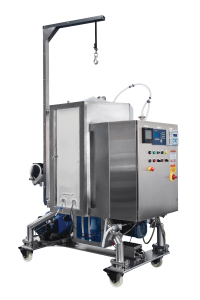 This webcast features: Anthony Hawrylechko, Director of Microbial Bioprocess, Cytovance
This webcast features: Anthony Hawrylechko, Director of Microbial Bioprocess, Cytovance
Protein folding by dilution is a common approach used in the manufacturing of biologics derived from microbial expression systems. This typically involves the solubilization of a washed inclusion body preparation containing the concentrated product polypeptide with a strong chaotrope or detergent solution. The denatured, inactive product solution is then diluted into a combination pH and red/ox buffer solution. Within this environment, the molecular diffusion rates of chaotrope, buffer components, and water are hundreds of times greater than that of a typical denatured polypeptide, requiring convective mixing is to separate the refolding polypeptide chains to favor the formation of the properly folded, active, monomeric product.
Certain types of large-scale impeller-based mixing systems generate very high shear forces at the tips of the impeller blades that may perturb the delicate structures of polypeptide chain in the process of folding into an active structure. However, these intense forces rapidly decrease to laminar, non-convective mixing conditions with increasing distance. As a result, large scale impeller mixing vessels often require significant time to reach a homogenous solution state. Given that the secondary structure formation of a folding polypeptide is around 10 microseconds, the mixing characteristics of some impeller based vessels are less optimal and tend to favor the aggregation of the polypeptides and product loss.
The imPULSE mixing technology provides a more evenly distributed mixing environment that can achieve homogeneity within a minute of protein solution introduction. The imPULSE technology is scalable from 30 L up to 5000 L and allows for robust control of process temperature, mixing, in-process monitoring, along with single use technology to result in an efficient development and manufacturing platform to establish a robust control strategy for protein folding of biologics.
